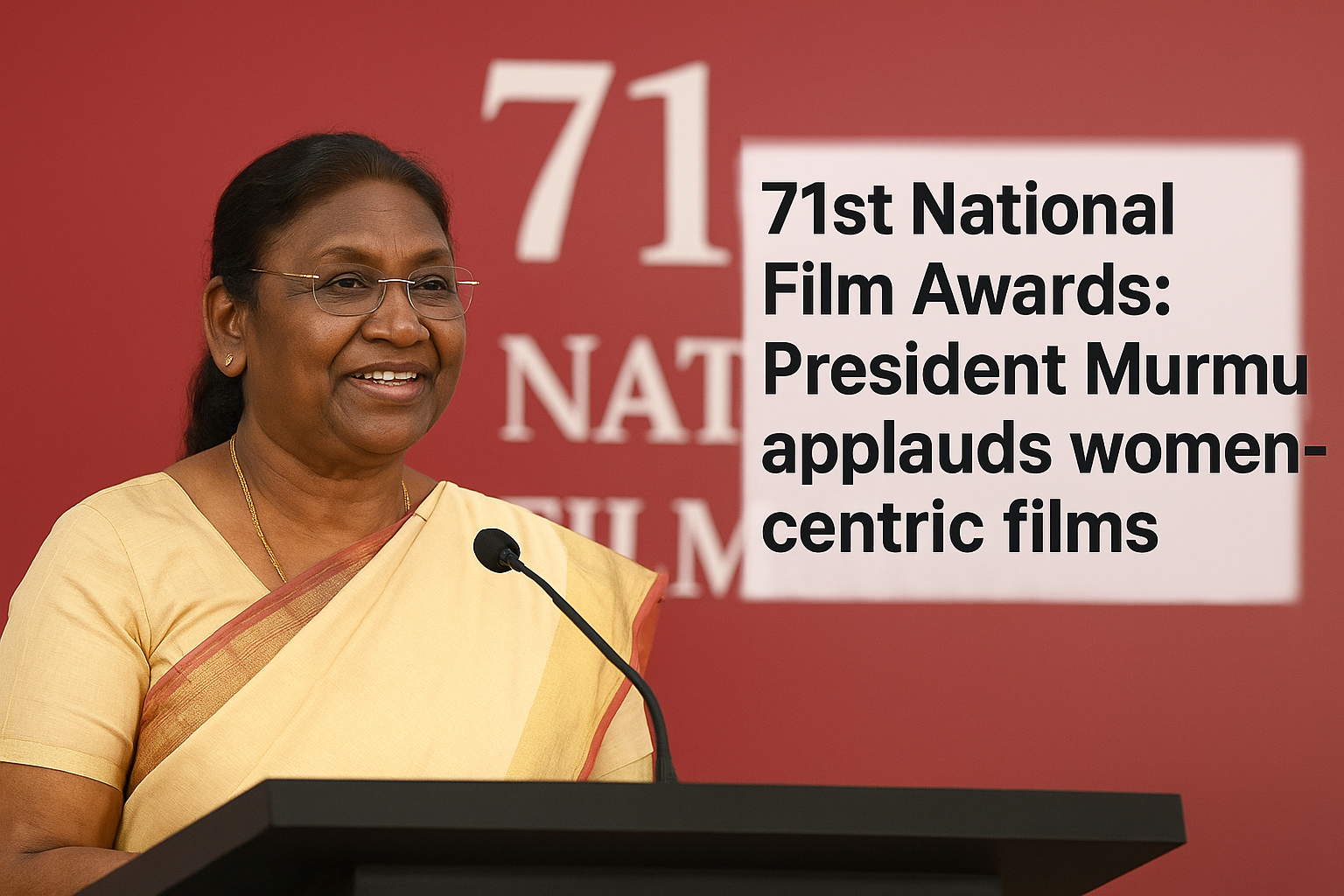Paraphrased Version
President Droupadi At the 71st National Film Awards, President Droupadi Murmu applauded the growing trend of films focused on women’s stories. She observed that films are no longer just entertaining pieces, but are increasingly serving societal purposes—highlighting women’s struggles with poverty, prejudice, and patriarchy. These films showcase mothers shaping their children’s values, women challenging social norms, navigating family complexities, and courageously speaking out against inequality. She praised the filmmakers behind such sensitive portrayals.
President Murmu also emphasized that while popularity is desirable, films that serve the public interest—especially addressing youth and social awareness—are more valuable. She underscored the importance of cinema as a powerful medium that can awaken nationwide consciousness and foster empathy among citizens. President Droupadi Furthermore, she expressed satisfaction that Indian cinema remains deeply rooted in local contexts—languages, dialects, cultures—yet connects to a broader national identity. She called on the film industry to ensure women are given equal opportunities, including in jury panels and recognition.
Additional Information
Here are more details to provide context and understanding:
- Event & Awards:
- The 71st National Film Awards were presented on 23 September 2025 at Vigyan Bhavan, New Delhi.
- Mohanlal received the prestigious Dadasaheb Phalke Award for 2023.
- Some key winners: 12th Fail won Best Feature Film; Rani Mukerji won Best Actress for Mrs Chatterjee vs Norway.
- What President Murmu Highlighted:
- That women-centric films are being made and are being rewarded.
- That such films depict real, challenging issues: poverty, patriarchy, prejudice; mothers shaping values; women confronting social stereotypes; President Droupadi women raising their voices in the face of injustice.
- President Droupadi Cinema’s role beyond entertainment: it’s a tool for awareness, social sensitivity, and strengthening an Indian cultural identity through films in many languages and regions.
- Her Suggestions / Criticisms:
- She noted the “small number of women filmmakers” among the awardees/jury, hinting that more equality is needed in opportunities.
- She encouraged the film community to strive not just for popularity but also for public benefit, especially influencing younger viewers.
- Why This Is Significant:
- The recognition of women-centric stories signals a cultural shift in Indian cinema, where stories of women are being treated with seriousness and depth rather than as side plots.
- It may help encourage more filmmakers to explore feminist themes, social justice, and complex female characters.
- It also underscores that the National Film Awards are being used to reward not just technical and artistic excellence but also socially relevant themes.
A Celebration of Indian Cinema
President Droupadi The 71st National Film Awards ceremony, held at Vigyan Bhavan in New Delhi, became more than just a stage for honoring artistic excellence—it turned into a platform to highlight the changing face of Indian storytelling. President Droupadi Murmu, while presenting the awards, praised the growing recognition of films centered on women’s experiences, challenges, and contributions.
President Murmu’s Key Message
In her address, President Murmu underlined that cinema today has moved beyond conventional entertainment. It has become a strong social medium that can question stereotypes, highlight injustices, and encourage inclusivity. She noted that women-centric films showcased at this year’s awards depict stories of mothers shaping their children’s character, women confronting deep-rooted patriarchy, and individuals finding the courage to raise their voices against prejudice.
She further stated:
- Popularity is a welcome achievement for filmmakers, but films that serve the public interest are of greater value.
- Indian cinema should strive to be not just commercially successful but also socially transformative.
- Women deserve equal opportunities in every domain of cinema, from acting to direction, from production to jury representation.
Recognition of Women-Centric Films
Several films with strong women-driven narratives earned top honors this year. These stories not only entertained but also shed light on issues of identity, social justice, and resilience. By honoring such films, the National Awards reinforced the message that cinema has a vital role in empowering marginalized voices, particularly women.
Other Major Highlights of the Ceremony
- Dadasaheb Phalke Award: Veteran actor Mohanlal was conferred the prestigious award for his outstanding contribution to Indian cinema.
- Best Feature Film: 12th Fail, a story of determination and grit, bagged the top honor.
- Best Actress: Rani Mukerji was recognized for her powerful performance in Mrs Chatterjee vs Norway, a film highlighting a mother’s fight for justice.
- Films from multiple languages—Hindi, Bengali, Tamil, Malayalam, and others—were celebrated, reflecting the diversity of Indian culture.
Cinema as a Reflection of Society
President Murmu reiterated that films should reflect the everyday struggles and triumphs of ordinary people. She pointed out that cinema, when rooted in social realities, can be a powerful tool for raising awareness among the youth and for strengthening national unity while celebrating regional diversity.
She also stressed that women’s participation behind the camera must be encouraged. Though women’s voices are now more visible in stories, their representation in production, direction, and jury roles remains limited. Expanding this space, she said, would create a more inclusive and balanced film industry.
The Significance of the President’s Remarks
The President’s emphasis on women-centric films comes at a time when Indian cinema is witnessing a cultural shift. Traditionally, women were often side characters or portrayed through stereotypical lenses. The awards this year highlighted how filmmakers are increasingly telling stories where women are central protagonists—complex, flawed, resilient, and inspiring.
By acknowledging this change, President Murmu not only praised current achievements but also encouraged the industry to keep pushing boundaries. Her message serves as a reminder that cinema is not just a creative industry but also a social institution that influences values, attitudes, and aspirations.







